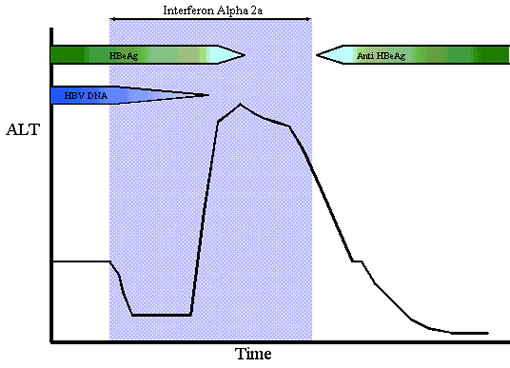Interferon
What is Interferon?
Interferon’s occur naturally in the body and are part of the bodies natural defence system against infection.
When the body it attacked by a virus, cells release interferons. There are three main groups of interferons: alpha, beta and gamma. These interferons help prevent the virus from infecting new cells and act as chemical messengers to alter the immune system. By injecting controlled quantities of interferon it is hoped to boost the bodies natural defences so that they can destroy the virus.
Currently the most generally available treatment for chronic active Hepatitis B is interferon Alpha-2B (Intron-A) although interferon Alpha-2A (Roferon-A) is sometimes used.
How successful is Interferon for Hepatitis B
Treatment is generally only offered to those with the “e” antigen.
The success rate of IF for Hepatitis B is 20-25% to cure, 25% – 45% to convert from active to persistent/subclinical HB. The success rate is lower in cases of long term infection, Success rates are lower if co-infected with HIV and relapse rates are higher, so a HIV test may be appropriate.
For people who have a partial response (I.e. loss of the ‘e’ antigen but the surface antigen is still present) they may go on to a full response (I.e. loss of the surface antigen) but this can take many years in a recent study after 5 years there was a 70% loss of the surface antigen in initial partial responders. However the return of the ‘e’ antigen has also been noted after several years in some people so it is important to have your antigen status tested periodically even after “successful” treatment with interferon.
There is also a risk of reactivation of the Hepatitis B virus even after a successful response, this occurs in around 5% of responders and normally occurs within 1 year. This is most common in those coinfected with HIV.
Hepatitis B reactivation has also been noted on those on immunosuppresive drugs, although this is very rare in patients who have lost the surface antigen.
Several factors have been identified that can improve or reduce the chances of a successful response but there is as yet no way to identify individuals who will respond. Factors include:-
Factors that are beneficial include:
Factors that are detrimental include:
- Low initial ALT
- High HBV DNA
- Being male
- Homosexual orientation
- Being of Asian/Chinese origin (This may be due to a genetic factor or due to the large number of childhood infections)
- Coinfection with HIV.
What is the recommended course of treatment.
The recommended course of treatment is for 4 to 6 months and the recommended dosage of Intron-A is 2.5 to 5 Million Units (MU) per meter square (/MSq) of body surface three times a week. However higher doses (10MU/MSq) of interferon are sometimes used and some studies indicate that high doses have a improved response rate although others do not. If you decide to take interferon, discuss dosage with your doctor and weigh up the possible better chance of responding with possibly worse side effects and cost (Interferon is expensive and cost may be relevant, depending on your medical insurance or heath care system). An alternate schedule is 5 million units daily which may ensure a more consistent level of interferon in the body.
You may wish to discus with your doctor taking N-Acetyl-Cysteine as it may improve your chance of response.
What happens if I decide to take Interferon
|
|
If you decide to take IF they normally take blood and measure complete blood count and differential, platelet count, electrolytes, liver enzymes, serum protein, serumbilirubin, serum urea and creatinine. When you start it is common to start on a low dose and build up over the course of a week to the full dose. A nurse will show you how to prepare and administer the injection, the injection, if self administered, is given subcutaneously in the upper thighs or lower abdomen.The injection is simple to do and relatively painless.It is recommended that 500mg to 1g of paracetamol (Acetaminophen) is taken 1 hour to 30 minutes before the injection as this tends to reduce the flu like side effects.It is also important to keep well hydrated by drinking lots of water.
You will start to notice the effects (If any) within 2 to 6 hours and by the end of the first week you should have an idea of how severe your side effects are (Remember they may diminish over the following weeks – months). Blood tests, as above, for chronic active HB are recommended in weeks 1, 2, 4, 8, 12 and 16 however they may wish to make tests more frequently and/or monitor additional things. |
Interferon Injection Sites
For chronic active Hepatitis B ALT levels may remain constant or decrease over the course of treatment however if ALT flares to >= 2 time base level then treatment with Intron-A should be continued unless signs or symptoms of liver failure are observed. If ALT flare occurs blood tests should be carried out at 2 weekly intervals. In chronic HB this may be a good sign because in some people this flare is coincident with clearance of viral DNAp.
After 1 months of treatment if markers for viral replication or HBeAg do not decrease the dose may be escalated according to tolerance of IF. If after 3 to 4 months no improvement has been seen then discontinuation of therapy should be considered. If some improvement is seen, they may wish to extend the IF course to 6 months.
After treatment with interferon they may wish to take another biopsy to assess the effectiveness of the treatment.
How can I tell if I am responding?
A “classic” profile for ALT in interferon responders is shown below
However just because your ALT follows a shape similar to the above graph it does not mean that treatment will be successful. Also the effects of interferon therapy may be delayed and loss of the “e” antigen may occur several months after completing therapy.
What are the side effects of Interferon. (Intron-A)
Side effects from Intron-A vary from person to person and some people can tolerate very high doses (30MU/MSq 3 times a week) with few or no side effects. Some people have such severe side effects on 1MU/MSq that they have to stop taking it. However most people have ‘flu like’ symptoms and in many people these side effects die down after 2 weeks – 3 months to manageable levels however some people may have side effects for the whole course of treatment. From the manufacturers literature:-
“Studies in patients and healthy individuals showed the most common adverse effects were ‘flu-like’ symptoms , fatigue, fever, leucopena or thrombocytopenia and Central Nervous System (CNS) effects”.”Less common adverse effects include vomiting, diarrhoea, arthralgia, asthenia, somnolence, dizziness, dry mouth, alopcia, flu like symptoms (unspecified), back pain, depression, malaise, pain, increased sweating, taste alteration, irritability, insomnia, confusion, impaired concentration and hypotension”.
“Rarely reported adverse reactions include abdominal pain, nervousness, injection site disorders, paresthesia, herpes simplex, flushing, weakness, pruitis,” (Itching) “eye pain, anxiety, epistaxis, coughing, pharyngitis, impaired consciousness, weight decrease, face oedema, dyspnoea, dyspepsia, tachycardia, arrhythmia, hypertension, increased appetite, decreased libido, hypoaesthesia, taste perversion, loose stool and gingival bleeding.”
“Hyperthyroidism or hyperthyroidism and hyperglycaemia have also been observed rarely, as hepatotoxicity, including fatality.”
Most of the above effects are dosage related and reversible on interruption or cessation of treatment. However in the small number of people (Less than 1%) that develop thyroid abnormalities this is generally permanent but can be treated conventionally.
The effects interferon has on the central nervous system can also be debilitating and interferon can induce depression, mental confusion and rarely suicide attempts have been reported. Interferon should be given with caution to anybody with a history of depression. It has been reported that the use of anti depressants can be beneficial in those suffering interferon-induced depression.
Interferon also reacts with other drugs. Narcotics, Hypnotics or sedatives should be taken with caution concomitantly with IF injection. Xanthine derivatives should also be administered with caution and if so serum theophyline levels should be measured. I recommend discussing any other medicines either prescription or over the counter with both your doctor and the pharmacist with interferon. (Note: Xanthine derivatives are frequently found in cough mixtures.)
Should I take interferon?
This is your decision and there are many factors you will need to consider it’s your choice. Some of the pros and cons are:-
PRO’s:-
- Treatment for Hep B is normally a fixed course of between 4 – 6 months so you can plan for it.
- Interferon has a relatively high response Rate.
- You may have few of no side effects from the Interferon.
- The sooner you start treatment the better the success rate.
- You have a much better prognosis if you respond to treatment.
CON’s:-
- In time you may clear the virus on your own without Interferon.
- Better drugs with less side effects may appear.
- You may have bad side effects and be unable to work during treatment and although rare some side effects may be permanent.
- The effects of interferon may put a very heavy strain on your relationships.
There are may other Pro’s and Con’s and there is no “right” answer.
The decision you make with regard to your current circumstances is the right one.
What if I do not respond to interferon.
There are some options available to those that do not respond to interferon, including some of the drugs discussed on the next section. Other options involving interferon are:-
Another course of Interferon
In non responders studies have shown that a second course of interferon may be successful (40%?) although it is usual to wait around 6 months to a year before attempting another course.
It may also be advisable to wait until ALT is high and HBV DNA low to increase the chance of a response to another course of interferon.
Prednistolone Priming
For non responders to interferon and where response is predicted to be unfavourable (E.g. Low or only slightly elevated ALT before treatment) recent studies show that prednistolone priming may assist in creating a response. Prednistolone priming may also be used if after 16 weeks no response to interferon has been observed a interferon is withdrawn and a course of prednistolone is given (6 weeks?)
Prednistolone priming consists of taking the corticosteriod prednistolone for a period, this suppresses the immune system. After a few weeks prednistolone is withdrawn, the immune system kicks back in and ALT flares, interferon is then started for between 4 and 6 months.
Note: The ALT flares up then drops over the course of interferon treatment it does not show the drop then flare normally associated with a successful response to interferon.
This treatment is relatively new and studies are still being performed there are dangers involved with prednistolone priming as after withdrawal the damage done by the immune system to liver cells may cause more problems. Prednistolone priming is still experimental (?) but you may wish to consider it if a non-responder to interferon.
Continued use of interferon.
If your ALT reduced to normal levels while on interferon it may be possible to take interferon for an extended period in the hope of reducing liver damage. However more research needs to be done to determine if there is a long-term benefit in doing this.






